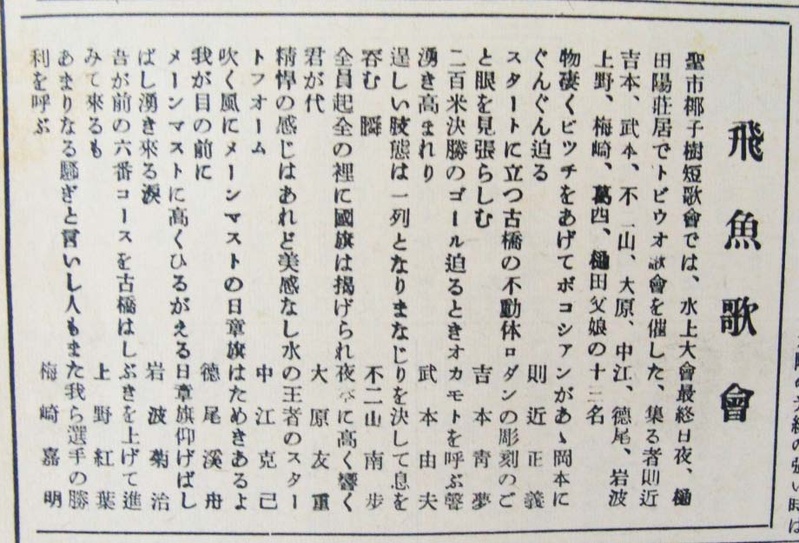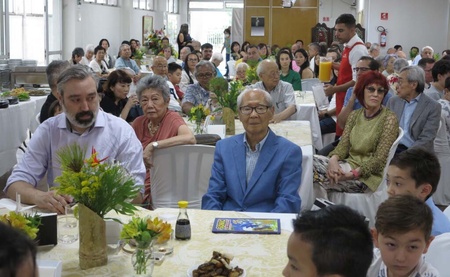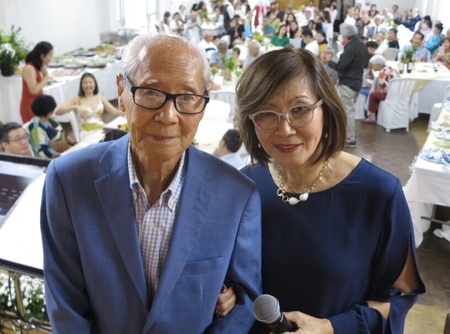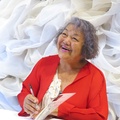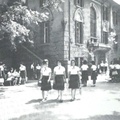A poetry reading after watching "Flying Fish of Fujiyama"
Umezaki settled in the Brazilian coffee plantations of Cafelandia and worked in the fields in the colony. During the war, Japanese immigrants were forbidden to move as enemy nationals, and had no choice but to devote themselves to work. During that time, Umezaki studied photography and literature, and in 1949 he left the country and opened the first photo studio on San Joan Street, where he pursued his passion for literature while raising his children.
As soon as Japan was allowed back into the International Swimming Federation in June of the same year, Furuhashi, Hashizume and six other swimmers were invited to participate in the U.S. Championships held in August in Los Angeles, USA, where they set new world records one after another and were praised as the "Flying Fish of Fujiyama." The following year, in 1950, they toured South America at the invitation of the Brazilian Ministry of Sports.
The All-Brazil Swimming Championships were held for four days from March 22nd at the Pacaembu Pool in São Paulo, where Furuhashi achieved great feats, including setting a new South American record in the 400m freestyle. By special arrangement, for the first time in eight years since the severance of diplomatic relations, the Japanese flag was fluttering in public places, providing great comfort and encouragement to Japanese immigrants who had endured the difficult wartime period.
In the August 12, 2016 edition of the Nikkei Shimbun, “ Okamoto Tetsuo, a Hero of Brazilian Swimming: A Miracle Born from Japanese-Brazilian Exchange (4) ,” Umezaki talked about his impressions when he actually went to watch the tournament at the Pacaembu pool. “Before the tournament, some people were quite cold and wondered what all the fuss was about, and I was the same. But as I watched the Japanese athletes perform well, before I knew it, I was joining in the excitement, and in the end I was really moved.”
He added, with deep emotion, "When the Hinomaru flag was raised, Kikuji Iwanami, who was standing next to him, was in tears." Iwanami gives the strong impression of being a calm intellectual, but on this occasion, it seems he was unable to contain his excitement.
"There were no winners or losers that time, everyone gathered at the pool. Because it was a swimming championships in Brazil, normally the majority of the spectators were Brazilian. However, at that championships half were Japanese. In that atmosphere, Furuhashi and the others won, beating the Brazilian athletes by more than ten meters. Seeing them win we all felt relieved, and when the Japanese flag was raised we all shed tears. Looking back on it now, it was a truly special day," he recalled.
Umezaki was 27 years old at the time and the youngest member of the tanka poetry society, Yashikoju. I went to see it with some of my seniors, and before the excitement had worn off, we stopped by a member's house and held a "Flying Fish Poetry Gathering." That work was published in the Paulista Newspaper on April 1, 1950.
He has published a total of 14 books, including poetry collections and anthologies of novels.
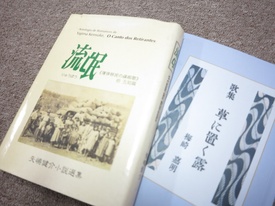
Umezaki continued to write tanka and published collections of poems such as "Forty Lives," "Trajectory," and "Grass Ears," and recently published a collection of poems titled "Dew on the Grass" to commemorate his 99th birthday (his 99th birthday), in the year he turned 100. He has published a total of 14 books, including "Slaves and Immigrants," which contains his own tanka and novels, "Ryubo," an anthology published under his pen name as a novelist, "Kanae Joint Tanka Collection," which he compiled with three fellow poets, and a collection of essays.
In terms of his awards, he won the 8th Paulista Literary Prize in 1964 for his novel "Around Sayo," the Colonia Literary Prize in 2004 for his collection of short stories "Ryuman," and again in 2020 for his essay "Record of Forgetfulness." He can truly be said to be one of the leading figures in Colonia literature.
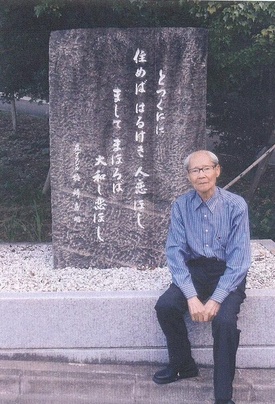
During that time, he served as president of the Nara Prefecture Association in Brazil from 1984 until 2000. In 2002, a monument to Umezaki's song was erected at the Fureai Hiroba in Ikaruga Town in his home prefecture, and his family was invited to a grand celebration.
In particular, his novel "Ryuumang (The Painful Song of a Lucky Immigrant)" depicts the faint love between a young man who is exiled to an island just after the end of the war as a hardliner of the winners, and a young woman who is worried about whether to dedicate her life to her family. This is a masterpiece that sublimates his own immigrant experience into a novel.
In the preface, Matsui Taro commented, "Yajima writes as a song of eternal regret about the unfortunate encounter between young people who crossed the ocean during a generation of unprecedented upheaval in world history. I read it through, losing track of time on a long autumn night. It left a lasting impression of sorrow and sorrow. It is a masterpiece that stands out in the recent world of Japanese literature."
Matsui Taro is the only novelist from Brazil's Japanese community to be recognized in Japan, with two collections of short stories published, "Utsurobune" (editor: Nishi Narihiko, Hosokawa Shuhei, Shoraisha, 2010) and "Toi Koe" (same publisher, 2012).
Eldest daughter reveals the secret to longevity
A party to celebrate Umezaki's 100th birthday was held at the Shizuoka Prefectural Hall in Sao Paulo from noon on March 25th, with about 120 people, including relatives and friends from haiku, tanka, and writing clubs, gathering to renew old friendships over delicious food.
First, his eldest daughter Regina spoke on behalf of the family, saying, "Let's all aim to live to a healthy 100 together. I think the secret to my father's long life is doing what you want to do, having friends, and taking care of yourself. He lived a regular life, including waking up, going to bed, and exercising. For breakfast, he had a fruit salad with linhasa (flax) and honey, half an apple, toast with jam, and milk with coffee. For dinner, he started the day with a leafy vegetable salad, followed by a stew containing sweet potato, taro, pumpkin, mushrooms, seaweed, and tofu. For dessert, he had just fruit."
Next, he walked briskly up the stairs and onto the stage, where he expressed his gratitude, saying, "I was born in 1923, but I feel like I'm about 70 years old. After I started performing, I was trained by my senior literary colleagues. I've gotten into the habit of racking my brains over this and that, which has helped me avoid senility. I'm glad that this event has been held thanks to the efforts of my daughter and her husband."
On behalf of the members of the literary circle "Tachibana no Kai," of which Umezaki is one of the founders, Yahiroo Kakihana took the microphone and delivered a congratulatory speech, saying, "At each writing meeting, he always presents a new work. He has a truly youthful style, and writes not only essays but also tanka and novels, which never cease to fascinate us." Kotoji Murakami of the same circle also delivered a congratulatory speech and shouted "Banzai" three times.
His cousin, Akio Imaru, rushed over from Mariauba city in Parana state and said, "Starting with your uncle, we may see more and more centenarians in our family. We should definitely follow Uncle Yoshiaki's example in lifestyle."
The paper's haiku judge, Saiko Kosai (86 years old), said, "Looking at Umezaki, I feel that if you have the habit of using your brain, such as writing, you won't get senile. I would like to congratulate you from the bottom of my heart." Her tanka friend Misako Koike nodded in admiration, saying, "It's amazing that you've been a judge for decades and your mind and body haven't deteriorated."
Like Umezaki, saying what she wants to say and "doing what she wants to do" keeps her mind young, having friends keeps her sociable and lively, and doing things for herself allows her to continue living independently.
*This article is reprinted from the Brazil Nippo (April 4, 2023).
© 2023 Masayuki Fukasawa


